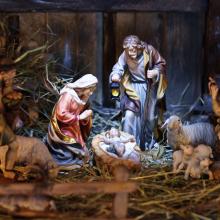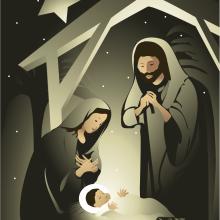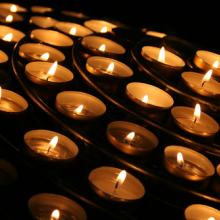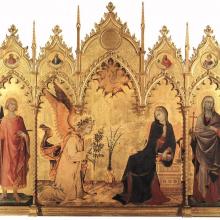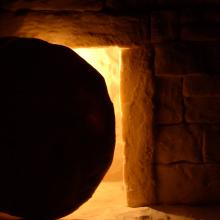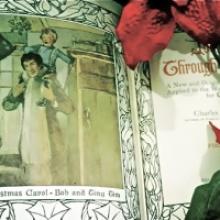Mary
Sculpture of Mary and Elizabeth and Church of the Visitation in Jerusalem. Creative Commons license.
In America, baby showers are times for women to come together and celebrate new life; presents are exchanged, advice given, and games played. Mary and Elizabeth celebrated the new life within them by exchanging presents of joy, encouragement, song, and prophecy. Both women were carrying children of promise. Neither woman had a convenient pregnancy. Mary and Elizabeth’s celebration shows the importance of women coming together for prayer, praise, and prophecy.

Detail from Antonello da Messina's "Annunciata." Image via Gandolfo Cannatella / Shutterstock.com
National Geographic magazine recently named Mary, the mother of Jesus, “the most powerful woman in the world” as an appraisal of her ongoing influence and popularity. But do Mary’s words and example have a prayer of being heard and effecting change in this time of war?
Indeed, this is war. America has effectively been engaged in continuous warfare since the weeks after September 11, 2001. In a few decades we’ll learn what happens when whole generations of people grow up and take charge of a society that has waged war their entire lives.
Attempts to tone down the descriptions we use for warfare or the way we conceptualize the present conflict don’t change anything. No end is in sight. Others turn up the rhetoric: after the San Bernardino shooting, at least one presidential candidate insisted the USA now finds itself in “the next world war.” Another one puffed up his chest and boasted of his resolve to “carpet bomb” people. We hear this stuff so often, we’ve become numb to its magnitude.
As part of this year-long effort to better understand what we mean when we talk about following Jesus, I’ve been making a more concerted effort to pray every day. Even though my tendency is to focus on silent, contemplative reflection, I’ve actually taken on a number of prayers that I do several times each, over a half-hour period or so.
Along with the Lord’s Prayer ("Our Father/God, who art in Heaven…"), the Jesus Prayer ("Jesus Christ, son of God, have mercy on me, a sinner"), the Serenity Prayer ("Lord, grant me the serenity to accept the things I cannot change…") and the Prayer of St. Francis ("Lord, make me an instrument of your peace…"), I also recite the Hail Mary. Not only that, but I use a rosary to go through my prayers.
I’ve shared this with some folks, and inevitably someone is surprised by this. I’ll get something like, “I didn’t know you’re Catholic.” Or, “Why pray to Mary? After all, she’s not actually God.”
Or is she?
Not that I think Mary personally was “God with skin on,” like we sometimes talk about Jesus. But like her son, I do tend to think that she pointed us toward God, which seems to be the one of the most important things Jesus did. In fact, when I’m asked what’s different about Jesus — as compared with other prophets and miracle workers in the Bible — I tend to respond that he, unlike others who preceded him in the biblical narrative, was more like the needle of a compass, pointing us in a common direction, rather than making himself the X marking the spot, the ultimate destination.
For me, Mary does this as well. There’s no story about her in the Gospels that suggests anything other than total devotion to God and to Jesus. In fact, in her conversation with God about becoming Jesus’ mother sounded much like Jesus prayer to God in the garden of Gethsemane, just before he was handed over to be crucified.
Both offered humble submission: Not my will, God, but yours be done.
Wizards! Caspar! Melchior! Balthasar!
Why fly straight to Fox Herod? Through
Unbounded night—! Bringing only news
Ripe for bloodletting. How black a star
You follow. Herod knows. How bizarre
A kingly claim. Will he oppose? Muse
Like Mary? Ha—! Mothers’ sons lose
Heads to swords & axes. Herod bars
The throne to Jesus. Who kills first?
One of the most interesting conversations at the Berkley Center focused on the desire for power in feminist discourse. In some ways, the feminist aspiration for power in terms of fiscal gain only perpetuates the patriarchal emphasis on economic power as the only definition of success.
One definition of female power that has its roots in Scripture is the power to be seen as equal before God. The concept that God created “man in his own image; male and female he created them” is imperative to feminist theory of shared power between sexes.
If we only define having power as women making capitalistic progress in our markets, we lose important aspects of divine femininity that render both male and female equal in the eyes of God.
Easter Sunday marks the holiest, most exalted moment of the Christian year. In Easter services all over the world, trumpets and organs blast. Flowers transform churches with their brightness. Worship leaders boldly proclaim: “Christ is risen!” Congregations echo back: “Christ is risen indeed!” The cycle of celebration and repetition begins as it should — a festive proclamation of good news. In Christ God has overcome the powers of sin and death, freeing us to live with hope and promising us life. Not just life after death, but full life, divinely inspired life — life in the here and now.
Christ is risen! Christ is risen indeed!
Even in these festive moments, many people express insecurity regarding the quality of their own believing.
Last December, I decided to run after dark and entertain myself by running through neighborhoods, looking at lighted Christmas decorations as I passed by. It was a novel twist on my regular exercise, and I enjoyed gazing at the beautiful, the creative, and the tacky alike.
Then, I started noticing the insides of houses, too. The Christmas trees were lit and decorated; the insides of the houses seemed warm and inviting. Suddenly, instead of an independent adult on a crisp winter jog, I felt more like a homeless orphan from a George MacDonald Christmas story looking in at something I did not have and of which I could not be a part. Needless to say, the run lost its sense of adventure.
Recently, it has struck me how strange the situation was, both in what I saw Christmas to be and in my decision that I “didn’t have it.”
With just a few days to go before Christmas, many Americans will be rushing around completing their Christmas preparations: doing their last minute shopping, finalizing travel plans, figuring out how to deal with awkward family dynamics. In many cases, they will be faced with what is popularly known as #firstworldproblems — problems of inconvenience of a privileged and affluent people: delayed flights, out-of-stock gift items, spotty cell phone coverage.
At the same time, many people, hidden amidst the consumer celebration that Christmas has become, will be struggling just to find their next meal, shelter, community, and hope.
Striking census bureau statistics released earlier this year paint a picture of an expanding American underclass, with 15% of Americans living at or below the poverty-line, 23% of children (the highest percentage of poor by age) living in poverty, and the evaporation of the American middle class.
On the one hand, at this time of year, our society is more aware of the poor. Holiday food collections, toy and clothing drives abound, as does the ubiquitous ringing of Salvation Army bells. And yet, in many ways the plight of the poor is more hidden by the bright lights and rush of the season.
The Metropolitan Museum of Art, on its website, has a wonderful slide show of paintings from the renaissance depicting the birth of Christ. This time of year those beautiful works of art often come to us through reproductions on Christmas cards. My husband and I support several charities that work in the emerging world so we also receive cards with nativity scenes reflecting cultures from across Africa and Latin American. Some of my favorite cards are the ones with nativity scenes from the Caribbean; I love their bright colors and exuberance.
Each of these cards, whatever the source, offers a different perspective on the birth of Christ; each presents a different emotion: serenity, joy, often the quiet peace associated with Christmas. What the artwork doesn’t convey, what our Christmas card may not fully be able to convey is the magnitude of Christ’s birth. Maybe the magnitude of this truly cataclysmic event is better depicted with words. And maybe there are no greater words then those of Mary.
The birth Christ ushers in peace through upheaval. It is a radical event. With the birth of Christ the world is turned upside down. Existing authority is challenged. Kings so terrified that their rage leads to mass killings. The significance of this night is not so gentle, not so calm. Not so much mentioned in our Christmas cards.
The clouds, pregnant with rain. No light
but an inkling of light. If Advent is a time
of waiting, of joyful anticipation, why are we
so often troubled? Consider Mary, the unknown
future she holds. Or Amy, staying the day
with D—, expecting in January, alone and now
spotting with unexpected blood, baby not yet
ready. What was our life before children? Years
of memories now include the children—as if they
already were born, only we could not see them.
Editor's Note: The following is the text of a sermon preached on Oct. 7 at the weekly chapel service at American Baptist Seminary of The West in Berkeley, Calif.
A woman struggling with postpartum depression died last week, killed either when her car crashed into the gates of the White House or by the bullets fired upon her by security guards and police. Her child survived without physical injury.
Social media were alive with speculations of terrorism, domestic or international, with connections between this incident and the government shutdown, with any number of theories about gun violence. We were ready for it. Raw and weary before the story even came to light, we were primed for the explosion of speculation and public bewilderment.
Have you not known?
Have you not heard?
It's a terrible story from every angle. We have so many such stories describing what is happening in our nation lately. We have much of ourselves invested in every aspect of the shutdown.
We are raw.
The spiritual noise is deafening.
We are rendered blind by all we see. It is too much.
It is as if the prophets are silenced;
souls have been rendered mute, blind, and deaf.
Have you not known?
Have you not heard?
Events such as these touch a raw place in our souls. Our souls struggle to proclaim the greatness of the Lord. So we turn instead to the sourness of our neighbor. We proclaim their deficits to the highest heaven.
Luke 1:39-55
Sometimes, the worse the tragedy, the more abhorrent the theology it elicits.
Still numb from the overwhelming evil perpetrated against helpless children and schoolteachers last Friday, now we have to read harsh words from James Dobson and others who declare the senseless carnage a sign of God’s judgment against America. His words are disgraceful. I find them exploitative and unchristian.
Certain Christians seem compelled to speak for God in disorienting moments like these, and the results are frequently terrible. The rest of the church has a responsibility to get angry and repudiate the statements.
In times like these, I find myself wanting to disavow anyone’s attempts to speak on God’s behalf.
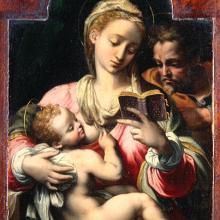
Sagrada Familia by Pompeo Cesura. RNS photo courtesy www.cattoliciromani.com, via Wikimedia Commons
At its heartwarming core, Christmas is the story of a birth: the tender relationship between a new mother and her newborn child.
Indeed, that maternal bond between the Virgin Mary and the baby Jesus has resonated so deeply across the centuries that depicting the blessed intimacy of the first Noel has become an integral part of the Christmas industry.
Yet all the familiar scenes associated with the holy family today — creches and church pageants, postage stamps, and holiday cards — are also missing an obvious element of the mother-child connection that modern Christians are apparently happy to do without: a breast-feeding infant.
Jesus certainly wasn’t a bottle baby. So what happened to Mary’s breasts? It’s a centuries-old story, but one that has a relatively brief answer: namely, the rise of the printing press in 15th-century Europe.
With the advent of movable type, historians say, came the ability to mass-market pornography, which promoted the sexualization of women’s bodies in the popular imagination. What's more, the printing press enabled the wider circulation of anatomical drawings for medical purposes, which in turn contributed to the demystification of the body. Both undermined traditional views of the body as a reflection of the divine.
In the sixth month of Elizabeth’s pregnancy, God sent the angel Gabriel to Nazareth, a town in Galilee, to a virgin pledged to be married to a man named Joseph, a descendant of David. The virgin’s name was Mary.
The beautiful anonymity and soft innocence of a young girl in Nazareth would be stripped by an angelic visitation. Who could ever envision the global veneration soon to commence? This Holy Virgin of Martini's masterpiece cannot be Mary's vision. The gilded, enthroned Mother of God, Blessed Virgin, Theotokos, Panagia. Millenia of adoration blurs the humanity of such a terrifying moment in the life of a child.
The angel went to her and said, “Greetings, you who are highly favored! The Lord is with you.”
Gabriel's praise for her resounds the Earth this Advent Season. Martini paints the words spouting from Gabriel's mouth, invading Mary's space. Her shoulder shrug speaks to Luke's revelations of her humanity. The Gospel record exposes her vulnerability and reluctance to embrace such a startling event.
The Gospel of St. Matthew, Chapter 28 tells us:
The angel spoke to the women: "There is nothing to fear here. I know you're looking for Jesus, the One they nailed to the cross. He is not here. He was raised, just as he said. Come and look at the place where he was placed.
"Now, get on your way quickly and tell his disciples, 'He is risen from the dead. He is going on ahead of you to Galilee. You will see him there.' That's the message."
To listen to a playlist of music for this Resurrection Day 2012, CLICK HERE.
Scrooge calls Christmas a “humbug.”
When his nephew tries to convince him otherwise, Scrooge responds:
“Merry Christmas! What right have you to be merry? What reason have you to be merry? You’re poor enough.”
The nephew retorts:
“What right have you to be dismal? What reason have you to be morose? You’re rich enough.”
The nephew concludes with this famous line about the holiday:
“Therefore, uncle, though it has never put a scrap of gold or silver in my pocket, I believe that it has done me good, and will do me good; and I say God bless it!”

The Holy Family by Margret Hofheinz-Döring via http://bit.ly/rK5376
I noticed this Christmas season, for the first time, that not only were Mary and Joseph forced to migrate under Rome’s census; not only was the Incarnate God born into a humiliating space — but, as they fled to Egypt, they never registered in Bethlehem with the census. A dream, an angel, told the migrant father to gather his family and run from the authorities. Unaccounted for in the empire, baby Jesus’ first movement in this world was a government-evading trek through the desert by night.
I think about this as, right now, my friend Estuardo is probably crouching in the dark somewhere in the desert along the Mexican border. At the same time my wife and I hang electric Christmas lights on our tree, get out our nativity sets, and read familiar illustrated books about the stars in the sky above the shepherds. Estuardo has told me, from previous voyages across the border by night, how clear the stars are when hiding from the border patrol lights.

"Away in a manger" at the Holy Cross Monastery, NY. Via Wylio: http://bit.ly/rRaH5G
I think of Mary, the young woman whose eyes were opened to God’s messenger, whose womb was opened to God in human flesh. The Greeks call her theotokos — the God-bearer.
She is the one who welcomed Jesus to make his home in her. Blessed among women, she is a model for us.
She’s not just an inspiration for a house of hospitality. She is one.
Two years ago, Leah was very pregnant during Advent. Because of high blood pressure, she was on bed rest for most of it. So we waited.
We waited for our daughter to come, and we waited for Christmas. We waited with Mary to greet face-to-face the One whom we invite into our lives every time we whisper a prayer.
Waiting, we learned, changes your relationship to time. You stop partitioning it into blocks, and you learn to receive it.
The real Dunder Mifflin Paper Co., the goods and evils of the pepper-spraying cop, N.T. Wright's fiery predecessor, the belt of the Virgin Mary closes Russian tour, Parker J. Palmer, and more.
Scripture constantly should be challenging our assumptions about our lives and in every aspect of society. Transformation is needed on a personal and also a political level. Scriptural priorities shouldn't be glossed over in order to protect political ideologies and comfort zones.
If we believe that what Jesus taught remains just as relevant today as it did when he physically walked among us, then it should still be a comfort to those on the margins of society and offensive to the wealthy and powerful. That doesn't mean that the wealthy and powerful can't be good and faithful followers of Christ, but Jesus did warn them that their walk will be a hard one. Wealth and power bring unique and difficult temptations ... If you never feel uncomfortable when you read the Gospels then you aren't paying attention.




